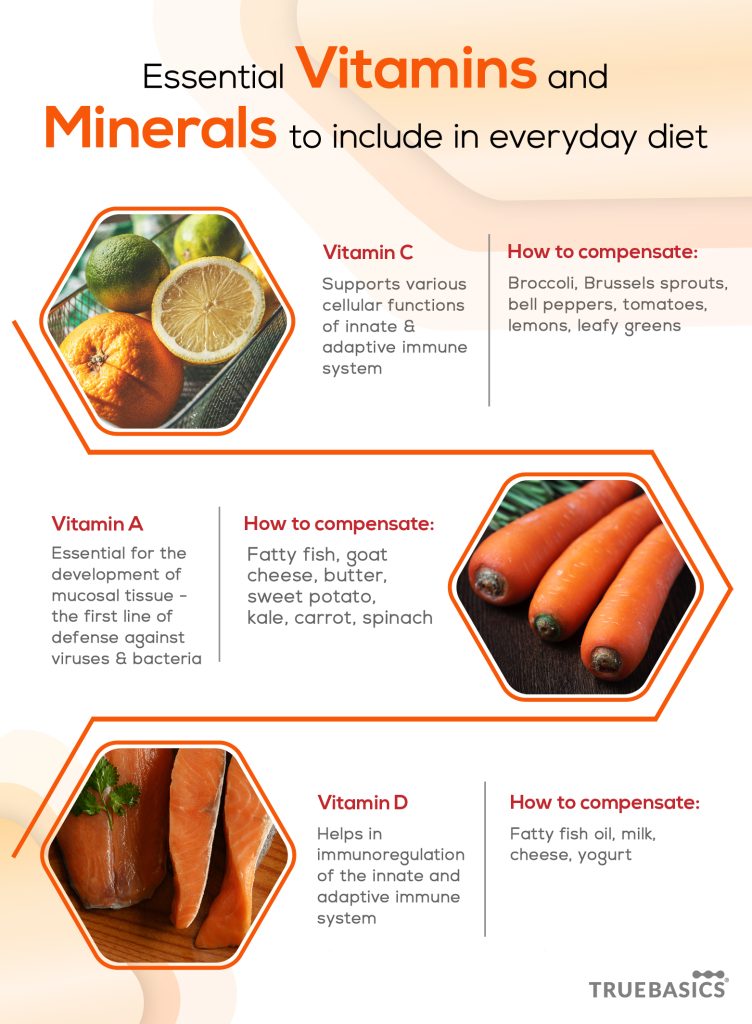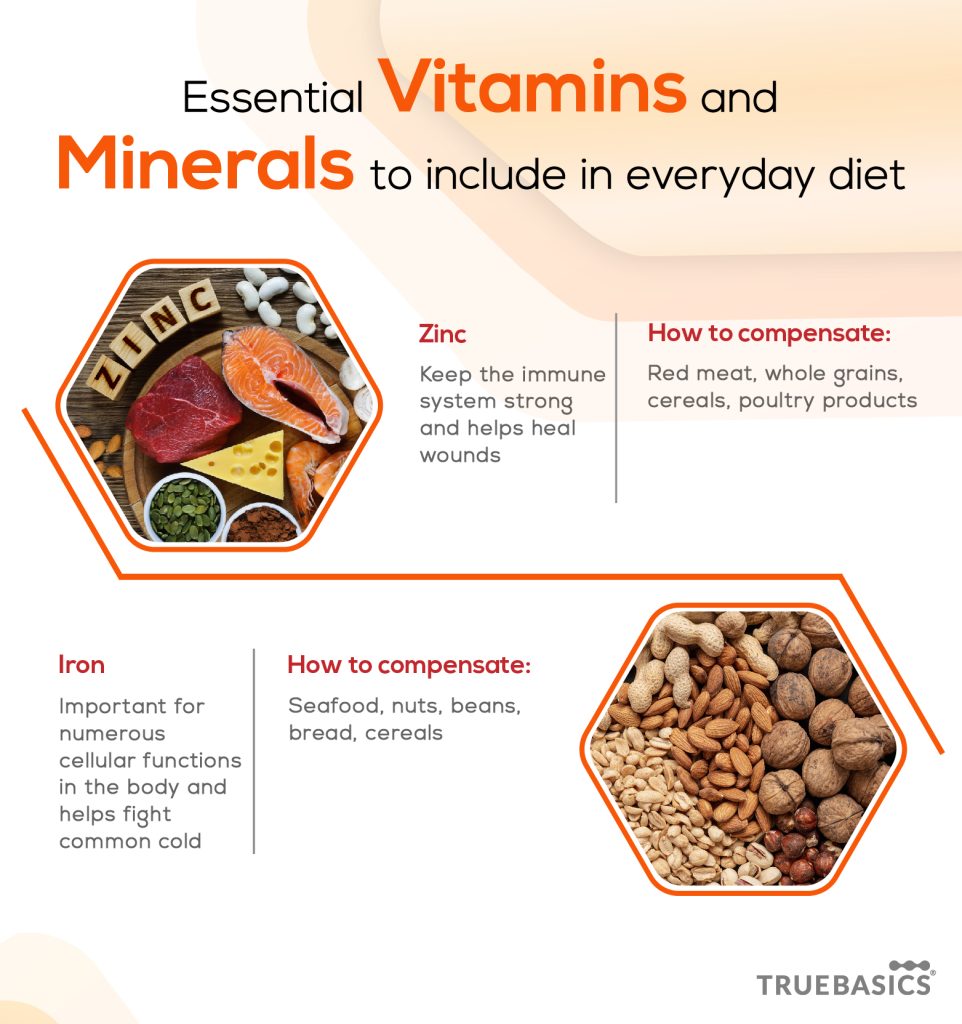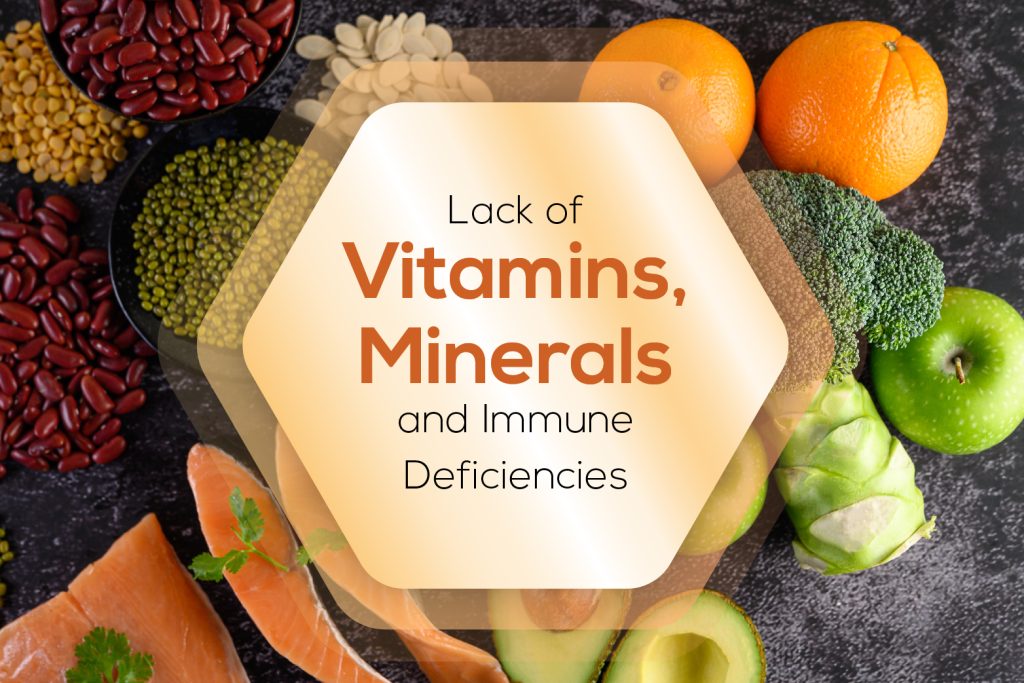Several studies have shown that as we age, our immune system tends to deteriorate and can be fatal for some people if they lack certain nutrients. That in no way means that old age people are immunodeficient but they may not respond to the cellular change as quickly as youngsters.
Impact of proper diet on immunity
Our Innate Immunity is what keeps us protected from harmful pathogens that we are exposed to on a daily basis. To preserve the innate immunity, it is advised to include lots of vitamins and minerals in your diet. Eating fruits and vegetables which are rich in nutrients like Vitamin C, Vitamin E, Zinc, Potassium, etc., often goes a long way towards strengthening your immune system. Micronutrients such as Amino acids, Zinc, vitamins play a significant role in the functioning of the body in more ways than you can imagine[1]. Micronutrients are used to describe the various vitamins and minerals in general and are needed in smaller amounts in comparison to “Macronutrients”, hence the term − Micro.
In 1753, a clinical trial conducted under the direct supervision of James Lind, a renowned doctor of the time, showed that people suffering from scurvy showed signs of convalescence on consuming citrus fruit[2]. Scurvy is caused by lack of Vitamin C and it can result in severe anaemia, exhaustion, ulcers and swelling in some parts of the body.
Certain nutrients are essential for our body to resist the presence of microbes that we are exposed to every day. It is recommended that a strict dietary plan be followed especially for elderly people as they have higher chances of getting infected. Poor health is exacerbated by a sedentary lifestyle, drinking habits, irregular sleep, smoking, and not exercising.[3]
How does nutrition deficiency affect our immunity?
People with lower micronutrient levels are more prone to getting infected with diseases as the innate immune system would be weak. Eating fast food or micronutrient-poor food is one of the primary factors as to why people tend to have a weaker immune system and fall ill more often. Your body has physical barriers such as skin and hair that are considered as the first line of defence against deadly pathogens. These barriers help you keep bacteria and viruses at bay. These barriers are circumvented if your immune system is weak and can lead to prolonged infections. People over the age of 60 are more susceptible to external pathogens. Studies show that two-thirds of elderly people who have common cold tend to develop respiratory illnesses and in comparison with younger people, are more likely to get infection soon.[4]
Most common deficiencies in children are that of Iron, Vitamin A and Iodine. Immunodeficiency in children can lead to malnutrition in kids at a very young age. Even in developed countries, children are found to have nutrition deficiency. The vitamins found in green and leafy vegetables usually are amiss from their diets because children refuse to eat vegetables and are more attracted to fast food. This is a rather common phenomenon that people tend to ignore but can have serious repercussions. Anaemia, Pneumonia, skin infections, low platelet count – are some of the symptoms that are caused by nutrition deficiency.[5]
Necessary Nutrients
Too many of us don’t eat enough of nutrient-rich fruits and vegetables necessary to keep us going.
Let’s discuss a few vitamins and minerals that should be maintained in everyday diet.
Vitamin C
Vitamin C supports various cellular functions of the innate and adaptive immune system. It is a source of multiple antioxidants and enzymes which have medicinal properties. Antioxidants help in reducing the oxidative stress which goes higher as we age due to certain environmental factors such as pollution, smoking and radiation. Adding Vitamin C in your diet can go a long way towards a healthy and long life. Deficiency of Vitamin C results in low production of ascorbic acid in the body which directly leads to Scurvy[6]. Scurvy is a fatal disease and individuals suffering from it can experience poor wound healing, impaired immunity, and can even catch pneumonia because of poor immunity. Scurvy makes the immune system prone to infections and the power to resist diseases weakens.[7]
Other than scurvy, poor immunity due to low vitamin C in the body can lead to other illnesses like pneumonia. Furthermore, vitamin C is also needed by the body to prevent cell damage from free radicals. When vitamin C levels are low, the body can also experience high inflammation, oxidative stress and can develop increased risk of heart diseases.[8]
Vitamin C deficiency is also known to affect your skin, as it tends to become dry and damaged – this happens when the outer layer of the skin, epidermis, lacks this essential nutrient. Easily getting bruised, swollen joints, bleeding gums, and sudden weight gain are some of the other results of lack of vitamin C in the body.[9]
Vitamin A
Vitamin A has a crucial impact on immune response as it is responsible for maintaining vision, promoting growth and development, and integrity of mucosal tissue in our body. Mucous is the inner lining of some organs of our body such as nose, mouth, lungs, and stomach. Mucous interacts with the external environment to protect us from infection. It is the first line of defence against a virus or bacteria and Vitamin A ensures that mucus secretion is happening in the body at all times.
Vitamin A is also involved in regulating the population of bone marrow cells in the nucleus of bone marrow through a process of binding Retinoic Acid Receptor (RAR).[10]
Deficiency of Vitamin A leads to dry eyes, anaemia, diarrhoea and can cause blindness in the most severe cases. However, excessive intake of Vitamin A can lead to Osteoporosis[11] which is a disease that makes the bones lose their density and can later on cause fractures.
A daily consumption of 900 micrograms for men and 700 micrograms for women is recommended by the doctors to promote the regulation of Vitamin A throughout your entire body. Provitamin A sources are – leafy green vegetables, fruits, tomatoes, orange and vegetable oils while more concentrations of Vitamins are found in liver and fish oils.[12]
Vitamin D
Vitamin D is a fat-soluble vitamin which can be produced both inside the body from scratch and by ingestion through food and supplements. Sunlight is a great source for Vitamin D that the body produces the moment Ultraviolet (UV) Rays enter our body.
Vitamin D is essential to keep your immunity in check. It plays an important role in the immunoregulation of the innate and adaptive immune system. Studies have shown that low levels of vitamin D in the body can be a cause of immune disorders, like developing infectious diseases and autoimmune disorders as well.[13]
It is necessary for bone growth and bone remodelling. Deficiency of vitamin can make the bones go too thin or brittle and to even break. Sufficient intake of Vitamin D with Calcium is required to prevent Osteoporosis. It has roles in cell growth, immune function and reduction of inflammation.
Daily intake of at least 10 mcg is required for children below the age of 18 years and at least 15 mcg is needed for both men and women. Salmon, Tuna and Fish oils are some of the best sources while dairy products like milk, cheese, yogurt and breakfast cereals are also full of Vitamin D.[14]

Zinc
Zinc is a mineral and is a very important constituent of our daily meals. It plays a pivotal role in keeping the immune system strong, helps heal wounds and supports growth and development. The recommended daily allowance of Zinc that you should take can go as high as 12 mg/day. Controlled doses of zinc can cure common cold, helps fight infection and heal wounds.[15]
Zinc deficiency causes skin infections, rashes, impaired immunity and hair loss. In more severe cases, zinc deficiency can lead to impotency, diarrhoea and weight loss. Zinc levels are low in alcoholics, strict vegetarians and people who are on poor diet.[16]
Some good food sources of Zinc are red meat, whole grains, cereals and poultry products. A healthy diet containing the necessary amounts of Zinc and other vitamins is essential to prevent Zinc deficiency.
Iron
Iron is essential for numerous important biological occurrences. Most of the Iron is present in the Haemoglobin and necessarily functions as an oxidizing agent to transfer and store oxygen. Other functions Iron is involved in are – cognitive functions such as memory, concentration, and problem solving, metabolism, physical growth and cellular functioning.[17]
Iron deficiency is the primary cause for anaemia. According to WHO, almost half of the 1.6 billion cases of anaemia worldwide happen because of iron deficiency. Anaemic people are subjected to several comorbidities from fatigue, difficulty in concentrating, weakness to impaired cognitive function and poor immunity. Recommended dietary intake ranges from 11 mg to 15 mg for adult men and women respectively.[18]
Seafood is very rich in Iron. Some other sources of Iron are – nuts, beans, vegetables, bread and cereal.

Conclusion
So, to sum up, our immune system is primarily responsible for our well-being. Our immune system is susceptible to many threats originating from both exogenous as well as endogenous viruses and bacteria. To protect oneself from such dangers to health, one should be wary of what to eat and to make sure one has all the necessary nutrients in daily dietary intake. Our lifestyle has a great impact on our immune system that can make or break our immunity. Eating habits doesn’t necessarily guarantee a better immune system, for example, vegetarians often lack much needed micronutrients that are found in meat and poultry products. The specific dosage of vitamins and minerals are needed if you want to have a long and prosperous life.
Sources :
[1] “Diet and Immune Function – NCBI.” 16 Aug. 2019, https://www.ncbi.nlm.nih.gov/pmc/articles/PMC6723551/. Accessed 7 Aug. 2020.
[2] “A Review of Micronutrients and the Immune … – NCBI – NIH.” 16 Jan. 2020, https://www.ncbi.nlm.nih.gov/pmc/articles/PMC7019735/. Accessed 7 Aug. 2020.
[3] “Nutrition and Immunity | The Nutrition Source | Harvard T.H. ….” https://www.hsph.harvard.edu/nutritionsource/nutrition-and-immunity/. Accessed 7 Aug. 2020.
[4] “Diet and Immune Function – NCBI.” 16 Aug. 2019, https://www.ncbi.nlm.nih.gov/pmc/articles/PMC6723551/. Accessed 7 Aug. 2020.
[5] “Immune Function and Micronutrient ….” 17 Oct. 2018, https://www.ncbi.nlm.nih.gov/pmc/articles/PMC6212925/. Accessed 7 Aug. 2020.
[6] “Vitamin C Deficiency (Scurvy) – StatPearls – NCBI Bookshelf.” 2 Jul. 2020, https://www.ncbi.nlm.nih.gov/books/NBK493187/. Accessed 7 Aug. 2020.
[7] “Scurvy: Symptoms, causes, treatment, and prevention.” https://www.medicalnewstoday.com/articles/155758. Accessed 7 Aug. 2020.
[8] “Vitamin C Deficiency | Patient.” 9 Jul. 2018, https://patient.info/healthy-living/vitamin-c-deficiency-leaflet. Accessed 7 Aug. 2020.
[9] “The Roles of Vitamin C in Skin Health – PubMed.” 12 Aug. 2017, https://pubmed.ncbi.nlm.nih.gov/28805671/. Accessed 7 Aug. 2020.
[10] “Role of Vitamin A in the Immune System – NCBI – NIH.” 6 Sep. 2018, https://www.ncbi.nlm.nih.gov/pmc/articles/PMC6162863/. Accessed 7 Aug. 2020.
[11] “Vitamin A: Bone Poison? – WebMD.” https://www.webmd.com/osteoporosis/news/20030122/vitamin-bone-poison. Accessed 31 Jul. 2020.
[12] “Vitamin A – Dietary Reference Intakes for Vitamin A, Vitamin K ….” https://www.ncbi.nlm.nih.gov/books/NBK222318/. Accessed 7 Aug. 2020.
[13] “Vitamin D and Immunity – ScienceDirect.” https://www.sciencedirect.com/science/article/pii/B9780124186804000245. Accessed 31 Jul. 2020.
[14] “Vitamin D – Consumer – Office of Dietary Supplements – NIH.” 24 Mar. 2020, https://ods.od.nih.gov/factsheets/VitaminD-Consumer/. Accessed 7 Aug. 2020.
[15] “Zinc – Health Professional Fact Sheet.” 15 Jul. 2020, https://ods.od.nih.gov/factsheets/Zinc-HealthProfessional/. Accessed 7 Aug. 2020.
[16] “Zinc deficiency: Symptoms, diagnosis, and treatment.” 22 Dec. 2017, https://www.medicalnewstoday.com/articles/320393. Accessed 7 Aug. 2020.
[17] “Iron and immunity: immunological consequences of iron ….” 28 Sep. 2010, https://www.ncbi.nlm.nih.gov/pmc/articles/PMC3173740/. Accessed 7 Aug. 2020.
[18] “Iron – Health Professional Fact Sheet.” 28 Feb. 2020, https://ods.od.nih.gov/factsheets/Iron-HealthProfessional/. Accessed 7 Aug. 2020.













